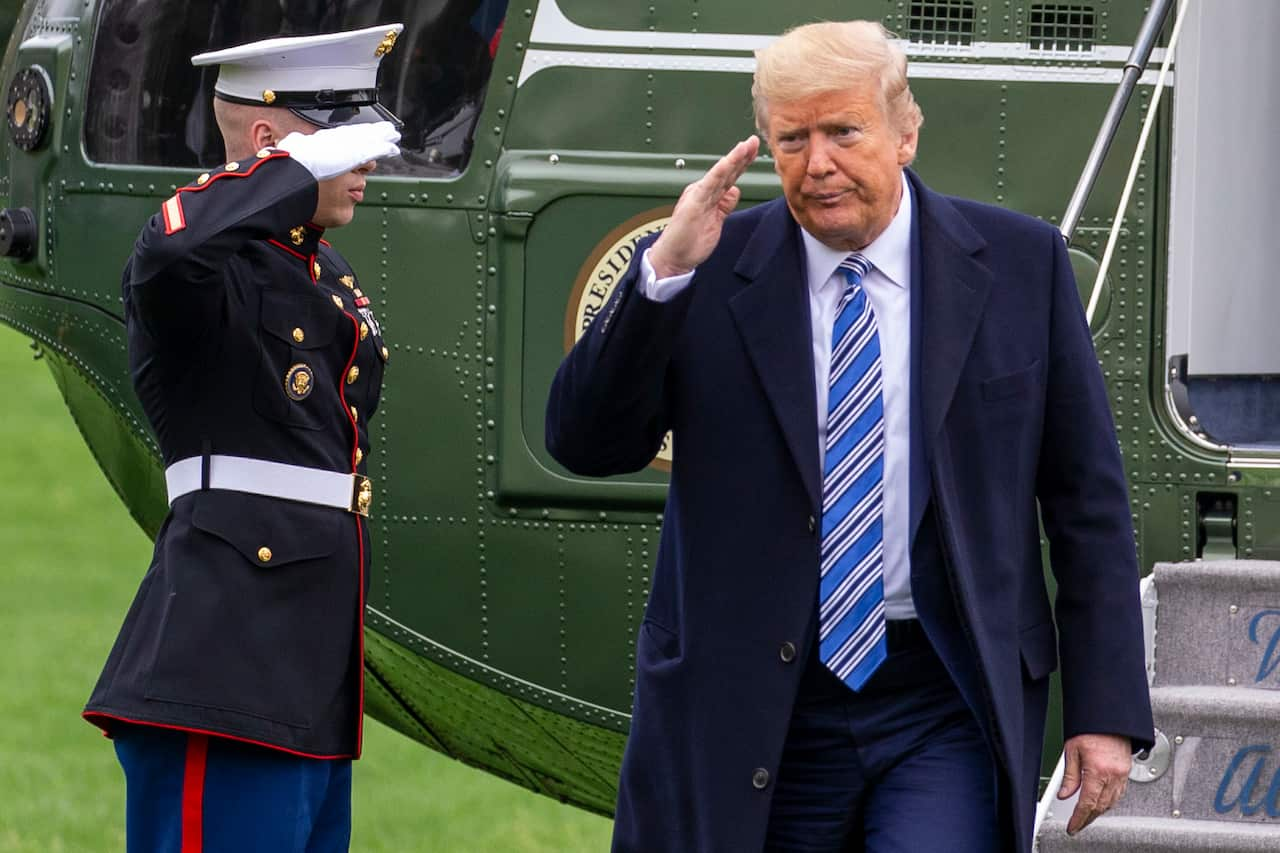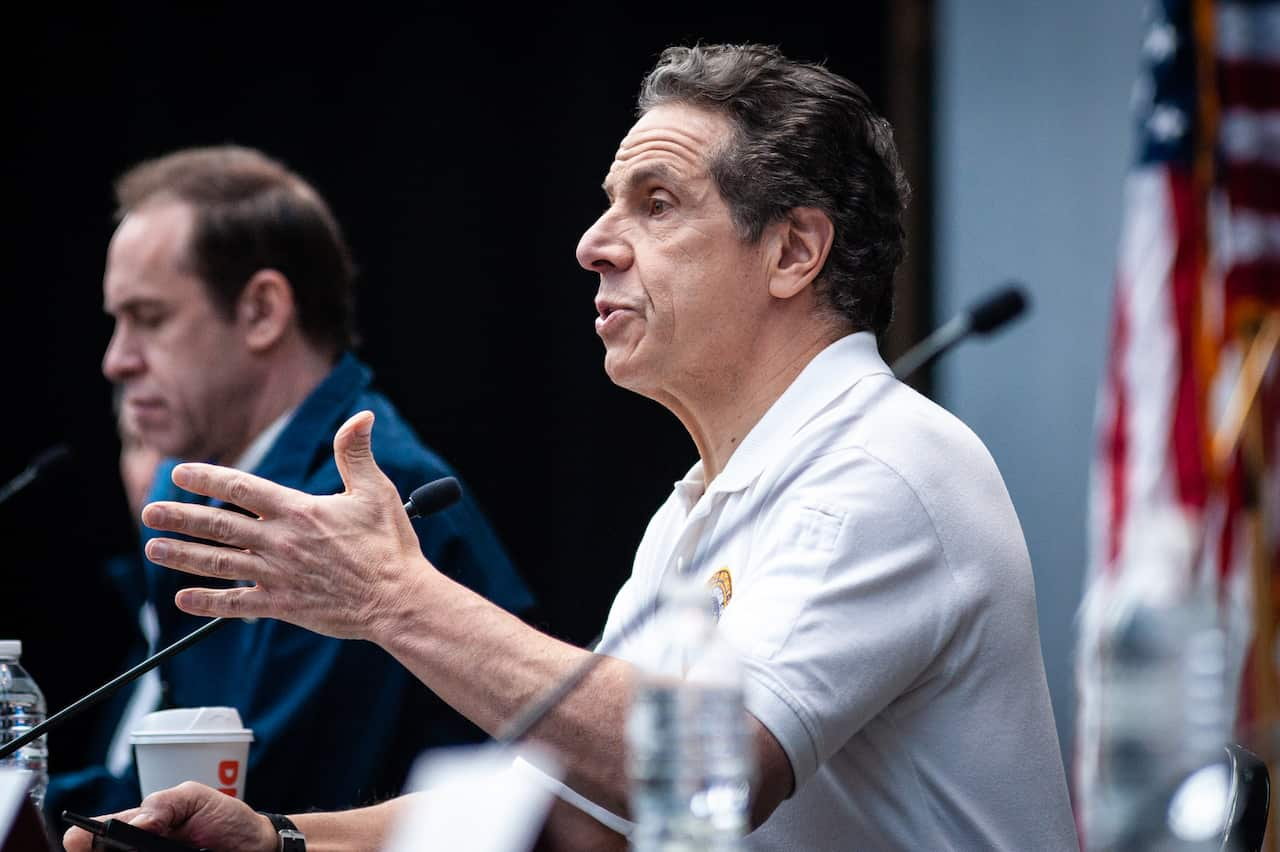US President Donald Trump has backed away from calling for a quarantine for New York, New Jersey and Connecticut, instead directing that a "strong travel advisory" be issued for the coronavirus epicentres.
After consulting with the White House task force leading the federal response and the governors of the three affected states, Trump said: "I have asked the CDCgov to issue a strong Travel Advisory, to be administered by the Governors, in consultation with the Federal Government. A quarantine will not be necessary."
The notion of a quarantine was sharply criticised by the governors of New York and Connecticut.
New York Governor Andrew Cuomo said such a move would be illegal, economically catastrophic, "preposterous" and short-sighted when other parts of the US are seeing cases rise, too.
He added that locking down the nation's financial capital would shock the stock market and "paralyse the economy" at a time when Trump has indicated he's itching to get the economy back on track.
Connecticut Governor Ned Lamont, also a Democrat, said Trump's words about a quarantine created a "certain amount of confusion" and that "confusion can lead to panic." He said such a quarantine order would be "impossible to enforce given the spider web of roads"
The federal government is empowered to take measures to prevent the spread of communicable diseases between states, but it's not clear that means Trump can ban people from leaving their state.
Courts have ruled consistently for years that the authority to order quarantines inside states rests almost entirely with the states,
When asked about legal authority for quarantine, the incoming White House chief of staff, Mark Meadows, said officials are "evaluating all the options right now." US President Donald Trump said Saturday he is weighing placing a two-week quarantine on New York and nearby states, the US epicentre of coronavirus infections, to slow the spread of the disease to other parts of the country.
10 million people would have been isolated
Quarantining three states would have been the harshest measure yet by the US government in the face of the coronavirus pandemic could isolate over 10 million people in the country's most densely populated region, and would come as total infections across the country have passed 115,000.
Mr Trump had indicated he could make a decision, even as New York Governor Andrew Cuomo said Mr Trump hadn't mentioned the idea in a phone call earlier in the day.
"There's a possibility that sometime today we'll do a quarantine - short-term, two weeks - on New York, probably New Jersey, certain parts of Connecticut," he said as he left the White House before announcing he would not proceed. The measure would be aimed at restricting travel from the crowded region to other parts of the United States, especially the southern state of Florida, a popular winter destination for New Yorkers and others in the northern part of the country.
The measure would be aimed at restricting travel from the crowded region to other parts of the United States, especially the southern state of Florida, a popular winter destination for New Yorkers and others in the northern part of the country.

U.S. President Donald Trump steps off Marine One on the South Lawn of the White House in Washington, D.C., U.S. Source: AAP
Mr Trump himself has residences in New York and Florida.
"Because they're having problems down in Florida. A lot of New Yorkers are going down. We don't want that. Heavily infected," Mr Trump said.
US epicentre
The New York area has been the most seriously hit by COVID-19 in the United States, with more than 52,000 cases in New York state.
Mr Cuomo said a quarantine had not come up in his talks with Trump Saturday morning. "I don't even know what that means," Mr Cuomo told a press briefing.
"I don't even know what that means," Mr Cuomo told a press briefing.

New York State Governor Andrew Cuomo provides a COVID-19 update at a press conference at the Jacob K. Javits Center Source: AAP
"I don't know how that could be legally enforceable. And from a medical point of view, I don't know what you would be accomplishing," Mr Cuomo said.
"But I can tell you, I don't even like the sound of it. Not even understanding what it is, I don't like the sound of it," he said.
The number of COVID-19 infections in Florida is much lower than New York, topping 3,700 Saturday according to USA Today.
On Wednesday, Florida Governor Ron DeSantis issued an executive order mandating two-week self-quarantines for anyone arriving or recently arrived from New York.
On Friday he made the same order for people coming from Louisiana, another coronavirus hotspot, and said police will put up checkpoints along the state line.
He also announced a two-week suspension of vacation rentals in Florida to discourage visitors.
"All we are trying to do is keep our residents here safe. If you are coming from one of the epicenters... don't come here because we are trying to protect our folks," he said.
'That's nuts'
But with coronavirus in all 50 states, experts said a quarantine on an area as large as the New York-New Jersey-Connecticut region might not be as useful as other more targeted measures.
Kent Sepkowitz, an infectious disease expert with the Memorial Sloan-Kettering Cancer Center in New York, told CNN it would not really work.
"Certainly it does not help New York do anything. It cuts us off from everyone else," he said.
"But the virus is all over the country now... So the notion that we can sort of blame New York and wall it off, and build a wall around Manhattan, that's nuts."
With AAP
Australians must stay at least 1.5 metres away from other people. Indoors, there must be a density of no more than one person per four square metres of floor space.
If you believe you may have contracted the virus, call your doctor (don’t visit) or contact the national Coronavirus Health Information Hotline on 1800 020 080.
If you are struggling to breathe or experiencing a medical emergency, call 000.
SBS is committed to informing Australia’s diverse communities about the latest COVID-19 developments. News and information is available in 63 languages at sbs.com.au/coronavirus
Share


